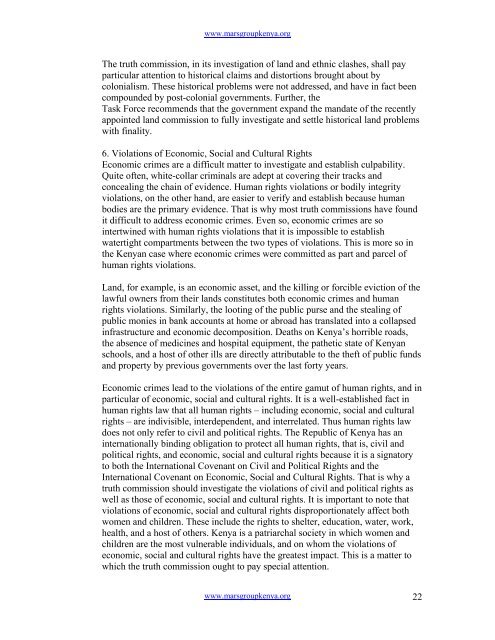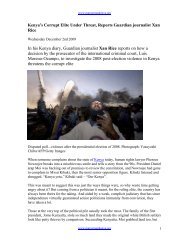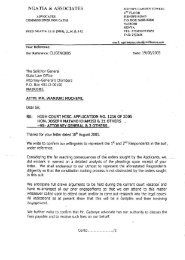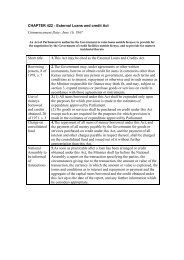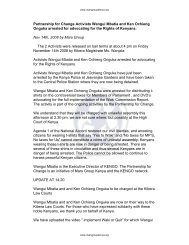why ambassador bethuel kiplagat should quit for kenya to attain ...
why ambassador bethuel kiplagat should quit for kenya to attain ...
why ambassador bethuel kiplagat should quit for kenya to attain ...
You also want an ePaper? Increase the reach of your titles
YUMPU automatically turns print PDFs into web optimized ePapers that Google loves.
www.marsgroup<strong>kenya</strong>.org<br />
The truth commission, in its investigation of land and ethnic clashes, shall pay<br />
particular attention <strong>to</strong> his<strong>to</strong>rical claims and dis<strong>to</strong>rtions brought about by<br />
colonialism. These his<strong>to</strong>rical problems were not addressed, and have in fact been<br />
compounded by post-colonial governments. Further, the<br />
Task Force recommends that the government expand the mandate of the recently<br />
appointed land commission <strong>to</strong> fully investigate and settle his<strong>to</strong>rical land problems<br />
with finality.<br />
6. Violations of Economic, Social and Cultural Rights<br />
Economic crimes are a difficult matter <strong>to</strong> investigate and establish culpability.<br />
Quite often, white-collar criminals are adept at covering their tracks and<br />
concealing the chain of evidence. Human rights violations or bodily integrity<br />
violations, on the other hand, are easier <strong>to</strong> verify and establish because human<br />
bodies are the primary evidence. That is <strong>why</strong> most truth commissions have found<br />
it difficult <strong>to</strong> address economic crimes. Even so, economic crimes are so<br />
intertwined with human rights violations that it is impossible <strong>to</strong> establish<br />
watertight compartments between the two types of violations. This is more so in<br />
the Kenyan case where economic crimes were committed as part and parcel of<br />
human rights violations.<br />
Land, <strong>for</strong> example, is an economic asset, and the killing or <strong>for</strong>cible eviction of the<br />
lawful owners from their lands constitutes both economic crimes and human<br />
rights violations. Similarly, the looting of the public purse and the stealing of<br />
public monies in bank accounts at home or abroad has translated in<strong>to</strong> a collapsed<br />
infrastructure and economic decomposition. Deaths on Kenya’s horrible roads,<br />
the absence of medicines and hospital equipment, the pathetic state of Kenyan<br />
schools, and a host of other ills are directly attributable <strong>to</strong> the theft of public funds<br />
and property by previous governments over the last <strong>for</strong>ty years.<br />
Economic crimes lead <strong>to</strong> the violations of the entire gamut of human rights, and in<br />
particular of economic, social and cultural rights. It is a well-established fact in<br />
human rights law that all human rights – including economic, social and cultural<br />
rights – are indivisible, interdependent, and interrelated. Thus human rights law<br />
does not only refer <strong>to</strong> civil and political rights. The Republic of Kenya has an<br />
internationally binding obligation <strong>to</strong> protect all human rights, that is, civil and<br />
political rights, and economic, social and cultural rights because it is a signa<strong>to</strong>ry<br />
<strong>to</strong> both the International Covenant on Civil and Political Rights and the<br />
International Covenant on Economic, Social and Cultural Rights. That is <strong>why</strong> a<br />
truth commission <strong>should</strong> investigate the violations of civil and political rights as<br />
well as those of economic, social and cultural rights. It is important <strong>to</strong> note that<br />
violations of economic, social and cultural rights disproportionately affect both<br />
women and children. These include the rights <strong>to</strong> shelter, education, water, work,<br />
health, and a host of others. Kenya is a patriarchal society in which women and<br />
children are the most vulnerable individuals, and on whom the violations of<br />
economic, social and cultural rights have the greatest impact. This is a matter <strong>to</strong><br />
which the truth commission ought <strong>to</strong> pay special attention.<br />
www.marsgroup<strong>kenya</strong>.org 22


